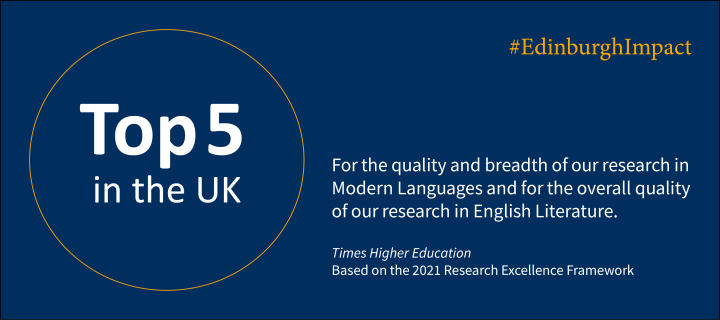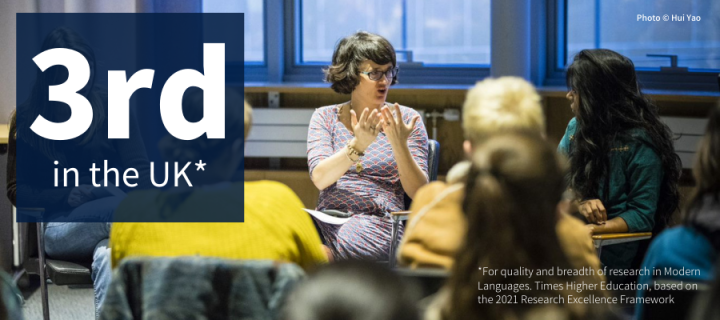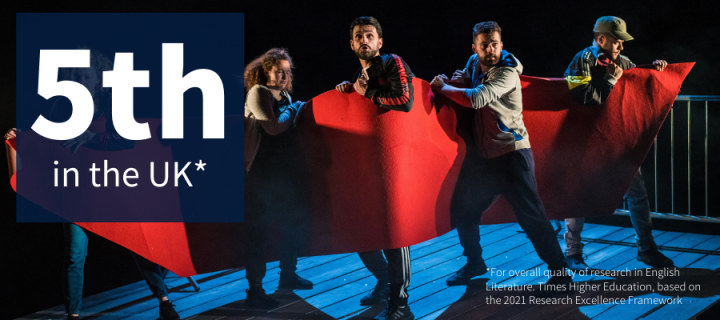REF 2021
Find out how our research and the difference it has made have been rated in the Research Excellence Framework.

The University of Edinburgh is ranked Top 5 in the UK for research in Modern Languages and in English Literature.
As reported in Times Higher Education, the rankings are based on the quality and breadth of our research in Modern Languages and the overall quality of our research in English Literature.
They come from the latest Research Excellence Framework (REF 2021) – the UK’s system for assessing the quality of research in UK higher education institutions. REF is broken down into 34 Units of Assessment (UOAs) across four panels.
Together with Linguistics, Modern Languages is assessed by REF in UOA 26, and English Literature in UOA 27. Both are in Panel D - Arts and Humanities.
Various colleagues in the School of Literatures, Languages and Cultures (LLC) have also been assessed by REF in the following Panels and Units of Assessment:
- Politics (Panel C - Social Sciences, UOA 19)
- Sociology (Panel C - Social Sciences, UOA 21)
- History (Panel D - Arts and Humanities, UOA 28)
- Theology (Panel D - Arts and Humanities, UOA 31)
- Music, Drama, Dance, Performing Arts, Film and Screen Studies (Panel D - Arts and Humanities, UOA 33)
Modern Languages

Our interdisciplinary community in Modern Languages produces innovative research that contributes, globally, to cultural enrichment and social justice.
We are rated 3rd in the UK by Times Higher Education for the quality and breadth of our research using the latest Research Excellence Framework (REF 2021).
Our REF performance recognises that our excellent work has a direct impact both nationally and internationally in politics, business and the third sector. Particular highlights include the International Network of Scholars and Activists for Afrikan Reparations (Dr Nicola Frith) and important interventions in Gaelic language policy in Scotland (Professor Rob Dunbar and Professor Wilson McLeod). We also support novel collaborations between academics and practitioners in the creative arts, especially film and theatre, and are proud to be home to translators of international standing.
Our research is multidisciplinary and international in nature, covering languages, culture and politics in Celtic and Scottish Studies, Modern European Languages, Middle Eastern and East Asian Studies, and working across many disciplines, including Memory Studies, Migration and Exile, Corpus Linguistics, Medieval Studies, Film Studies, Theatre and Performance, Disability Studies and Queer Theory.
With topics ranging from contemporary cultural responses to environmental catastrophe to language pedagogy, from analyses of nationalism and legacies of violence to developing Scotland’s literary and musical heritage, we set innovative research agendas that demonstrate the indispensability of language study and language-based research.
Excellence and impact beyond the UK reflects what drives our research on the countries and cultures we study, and it is great to see this recognised by REF. Beyond the Modern Language element of REF, which is just one part of a much bigger picture, our languages colleagues have helped the University of Edinburgh achieve excellence, and benefited communities, in assessed areas such as Politics, Sociology, History, Theology and Music, Drama, Dance, Performing Arts, Film and Screen Studies.
The success of this joint submission with Linguistics at the University of Edinburgh is a tribute to the creativity, talent and hard work of all members of our research community. At a time of increasing nationalism and isolationism, our pioneering research and committed partnerships across borders support values of openness, internationalism and critical citizenship.
English Literature

Research in English Literature, and the benefits it has brought to a range of partners and beneficiaries, have received outstanding endorsements in the latest Research Excellence Framework (REF 2021).
In Times Higher Education, English at Edinburgh is ranked fifth in the UK (out of more than 90 institutions) for the overall quality of its publications and other outputs, the impact of its research on people’s lives, and its supportive research environment.
Over 90 per cent of our research and impact is classed as world-leading and internationally excellent by Research Professional. 69 per cent is graded at the world-leading level – the highest of the REF’s four categories.
We have received this standout evaluation for research that ranges across literary history from the later Middle Ages to the present day, and is at the forefront of interdisciplinary fields including Digital and Environmental Humanities and studies of the history and future of books and material culture. Our submission covered collaboration with researchers in disciplines as varied as Education, Economic History, Informatics, and Astronomy.
Our researchers have been recognised for their extensive and high-quality work with external partners, ranging from museums, galleries, and libraries to charities, theatre companies, schools, and the Edinburgh International Book Festival.
Collectively, this work has facilitated literary and cultural engagement from Scotland to Ukraine to India to the Marshall Islands, and has enriched public understanding of topics including Edinburgh’s literary heritage, the literature of Orkney and Shetland, spy fiction, financial literacy, the impact of war and displacement, and the cultural history of childhood.
English’s research environment – which fostered this diversity of activities – was rated 100 per cent world-leading (joint top in the UK; Research Professional). The results confirm the Department’s standing as an international community of literary scholars and creative writers at all career stages whose research is world-leading in its breadth, diversity, quality, and impact on wider society.
This result is a testament to the incredible hard work and commitment of colleagues in producing research that is not only at the forefront of the discipline, but is also making a major contribution to public understanding and engagement. At Edinburgh, we’re proud of our long history as a centre for the study of Anglophone literature, and this outcome demonstrates that our scholarship and creative practice continue to pioneer new approaches and insights, especially in their increasingly international and interdisciplinary scope. We’re very well placed as a Department to continue to develop, strengthen, and diversify our world-leading research over the coming years.
This positive evaluation of research activity in the subject area of English and Scottish literature is fitting testimony to the sustained hard work of colleagues across the subject area over the period of the assessment. The results show the impact and significance of our growing interdisciplinary work in both critical and creative forms, and highlight the fact that research in our subject happens across geographical and disciplinary borders.
Browse our directory of research projects

